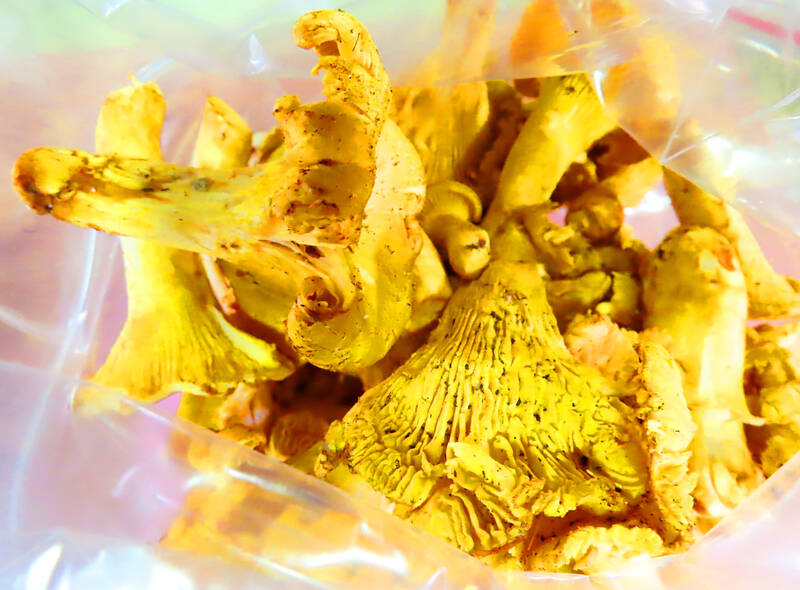A batch of chanterelle mushrooms from Lithuania was found to contain traces of radioactive residue exceeding the legal limit and was rejected at the border, the Food and Drug Administration (FDA) said yesterday.
The batch of mushrooms was found to contain 140.1 becquerels per kilogram of cesium-137, but the legal limit is 100 becquerels per kilogram, the FDA said.
The presence of cesium-137 was due to artificial contamination, indicating pollution in the area in which the mushrooms were cultivated, FDA Deputy Director-General Lin Chin-fu (林金富) said in a telephone interview.

Photo Courtesy of the Food and Drug Administration
Although this was the first time chanterelle mushrooms from Lithuania have not complied with import regulations, the FDA would use the strictest methods when monitoring and inspecting imports of chanterelle mushrooms from the country, the agency said.
The same would also apply to chanterelle mushrooms from France, which twice last year failed to comply with the Act Governing Food Safety and Sanitation (食品安全衛生管理法), the agency added.
Meanwhile, two batches of seasoning and condiments imported from the US, including a sirloin seasoning and Classico Italian Sausage sauce, were rejected for containing ethylene oxide, a carcinogenic substance that is banned in Taiwan, the FDA said.
Overall, 10 batches of seasoning and condiments from the US have failed to comply with Taiwanese import laws over the past six months, it said.
The FDA said that on Tuesday last week it asked US authorities to explain the failures and propose ways to improve by Sept. 5.
Such imports from the US are now subject to more through inspections, the FDA said.
Eleven other items were seized at the border, including oranges from Japan, Acerola cherry extract from China, and Danji cucumber slices from South Korea, as they failed to meet standards for reasons including excessive pesticide residue or the presence of additives, it added.

Taiwanese can file complaints with the Tourism Administration to report travel agencies if their activities caused termination of a person’s citizenship, Mainland Affairs Council Minister Chiu Chui-cheng (邱垂正) said yesterday, after a podcaster highlighted a case in which a person’s citizenship was canceled for receiving a single-use Chinese passport to enter Russia. The council is aware of incidents in which people who signed up through Chinese travel agencies for tours of Russia were told they could obtain Russian visas and fast-track border clearance, Chiu told reporters on the sidelines of an event in Taipei. However, the travel agencies actually applied

New measures aimed at making Taiwan more attractive to foreign professionals came into effect this month, the National Development Council said yesterday. Among the changes, international students at Taiwanese universities would be able to work in Taiwan without a work permit in the two years after they graduate, explainer materials provided by the council said. In addition, foreign nationals who graduated from one of the world’s top 200 universities within the past five years can also apply for a two-year open work permit. Previously, those graduates would have needed to apply for a work permit using point-based criteria or have a Taiwanese company

The Shilin District Prosecutors’ Office yesterday indicted two Taiwanese and issued a wanted notice for Pete Liu (劉作虎), founder of Shenzhen-based smartphone manufacturer OnePlus Technology Co (萬普拉斯科技), for allegedly contravening the Act Governing Relations Between the People of the Taiwan Area and the Mainland Area (臺灣地區與大陸地區人民關係條例) by poaching 70 engineers in Taiwan. Liu allegedly traveled to Taiwan at the end of 2014 and met with a Taiwanese man surnamed Lin (林) to discuss establishing a mobile software research and development (R&D) team in Taiwan, prosecutors said. Without approval from the government, Lin, following Liu’s instructions, recruited more than 70 software

BACK TO WINTER: A strong continental cold air mass would move south on Tuesday next week, bringing colder temperatures to northern and central Taiwan A tropical depression east of the Philippines could soon be upgraded to be the first tropical storm of this year, the Central Weather Administration (CWA) said yesterday, adding that the next cold air mass is forecast to arrive on Monday next week. CWA forecaster Cheng Jie-ren (鄭傑仁) said the first tropical depression of this year is over waters east of the Philippines, about 1,867km southeast of Oluanpi (鵝鑾鼻), and could strengthen into Tropical Storm Nokaen by early today. The system is moving slowly from northwest to north, and is expected to remain east of the Philippines with little chance of affecting Taiwan,